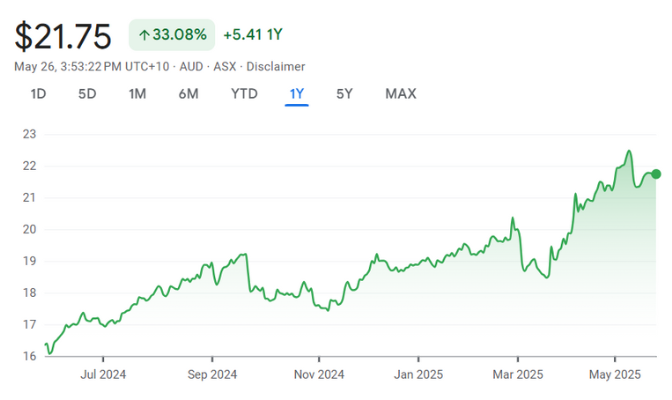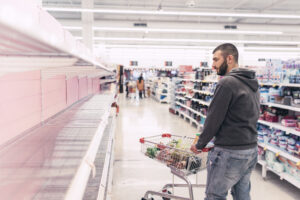Coles Group Ltd
(ASX: COL)Share Price and News

Overview of Coles Group
Coles Group (ASX:COL) is a major Australian retailer operating the Coles supermarkets (the second-largest supermarket chain in Australia), the liquor outlets under the Coles liquor banner (including FirstChoice, Liquorland and Vintage Cellars) and the flybuys rewards scheme. It also runs Coles Financial services that provides insurance, credit cards and personal loans.
Coles' Company History
Founded in 1914, named after the surname of its founder, Coles began as a single variety store in the Melbourne suburb of Collingwood. For the first few decades it was essentially an early 1900s version of 'The Reject Shop' offering discounted items. It famously boasted 'Nothing over 1/-' (1 shilling).
Over the decades, the company grew organically and through acquisitions, including liquor retailers and fuel convenience stores, to build a diversified retail portfolio. In the late 1940s it got into cosmetics and foodstuffs as married women entered the workforce.
During the 1960s, by which time it was run by Edgar Barton Coles (one of 7 of George Coles' sons) it opened freestanding supermarkets - the first of which was in the Melbourne suburb of Balwyn. The plan was it would be a one-stop shop for families to get everything on a weekly shopping list. And so it is to this day.
The 1980s saw the introduction of electronic scanners and printed receipts as well as many of its forays including into liquor. 1985 was a key year as it merged with Myer and listed on the ASX. Flybuys was introduced in 1993 and it launched the first service station in 2004.
In 2007, Coles was acquired by Wesfarmers, for $19.3bn in what was then the highest takeover in Australian history. It has since been surpassed multiple times, most recently by AirTrunk in 2024. Although under Wesfarmers' ownership it underwent significant restructuring and modernisation, Wesfarmers wanted a return on investment and also believed the company now warranted its own board.
And so in late 2018, Coles demerged from Wesfarmers and was relisted as an independent company on the ASX, refocusing on its core supermarket and liquor operations. Coles relisted at $12.49 per share and has gained over 70% since then - albeit flatlining except in the last 12 months.
The pandemic didn't result in stores being closed but did result in supply chain disruptions. It emerged from those difficult times and has had a better couple of years than Woolworths as cost-conscious consumers opted for Coles.
Future Outlook of Coles Group Ltd (ASX: COL)
Coles’ future outlook remains cautiously optimistic, supported by consistent revenue growth and strategic investments in technology and supply chain resilience.
In FY24, the company recorded $41.5bn sales revenue (up 5%), $3.7bn EBITDA (up 5%) and a $1.1bn profit (up 2%). While lower than Woolworths they were growing faster. More pleasingly, the company grew its eCommerce sales by 30% in supermarkets and 9% in liquor.
1H25 was even more positive with 4% sales growth, >10% EBITDA growth and 6% underlying NPAT growth. The company is recording strong eCommerce sales growth and is reaping returns on its investments in Automated Distribution Centres. It has 9.7m Flybuys members and it paid a dividend yielding 3.4% on an annualised basis.
Risks include rising input costs, aggressive pricing from Woolworths (which has hinted at responding to Coles in that way), and potential shifts in consumer spending amid economic uncertainty. Liquor has underperformed supermarkets and may continue to do so.
However, Coles’ strong market share and consistent cash flow position it well to manage these challenges.
Is COL a Good Stock to Buy?
From an investor’s perspective, Coles is certainly the better of the big 2 supermarkets right now given it is recording stronger sales growth and offering a yield beating inflation. The company’s strong cash flow and low gearing provide financial flexibility, strengthening its overall risk profile.
For investors prioritising income and exposure to Australia’s essential retail sector, Coles presents a reasonable buy—especially given its ongoing efforts to innovate and sustain profitability in a changing market.
The risks are competition with Woolworths hitting up, and rising costs (especially since the supermarket space is low-margin - Coles had a profit margins of under 3% in its most recent set of results).
Our Stock Analysis
Here are some ASX stocks that will benefit from a higher AUD, and stocks that will lose
The Aussie dollar has been surging in recent weeks and there are ASX stocks that will benefit from a higher…
Here are the Stocks to Buy if the RBA raises rates, and the stocks to sell!
Investors are probably pondering the Stocks to Buy if the RBA raises rates. Because while a rate hike is not…
Here’s why companies undertake demergers and spinoffs, and some of the most famous deals in the last decade!
Investors often get themselves into frenzies over M&A deals (or just speculation of them), but demergers and spinoffs get less…
Should I buy Woolworths or Coles shares in FY26? And why is Coles performing better right now?
Should I buy Woolworths or Coles shares? This is one of the top debates Australian investors can have. Obviously, this…
Which stocks that benefit from inflation the most? Here are 3 sectors to watch
Stocks that benefit from inflation do exist, but they might not be immediately obvious to find. After all, inflation can be…
6 ASX stocks facing competitive threats and whether they can prevail
In this article, we’re looking at ASX stocks facing competitive threats – not just standard market competition, but major threats…
Frequently Asked Questions
Coles currently offers a dividend yield of over 3%, supported by steady earnings. It paid out 37cps in 1H25.
Its payout ratio has been above 70% in recent periods, which investors should continue to monitor for long-term sustainability.





